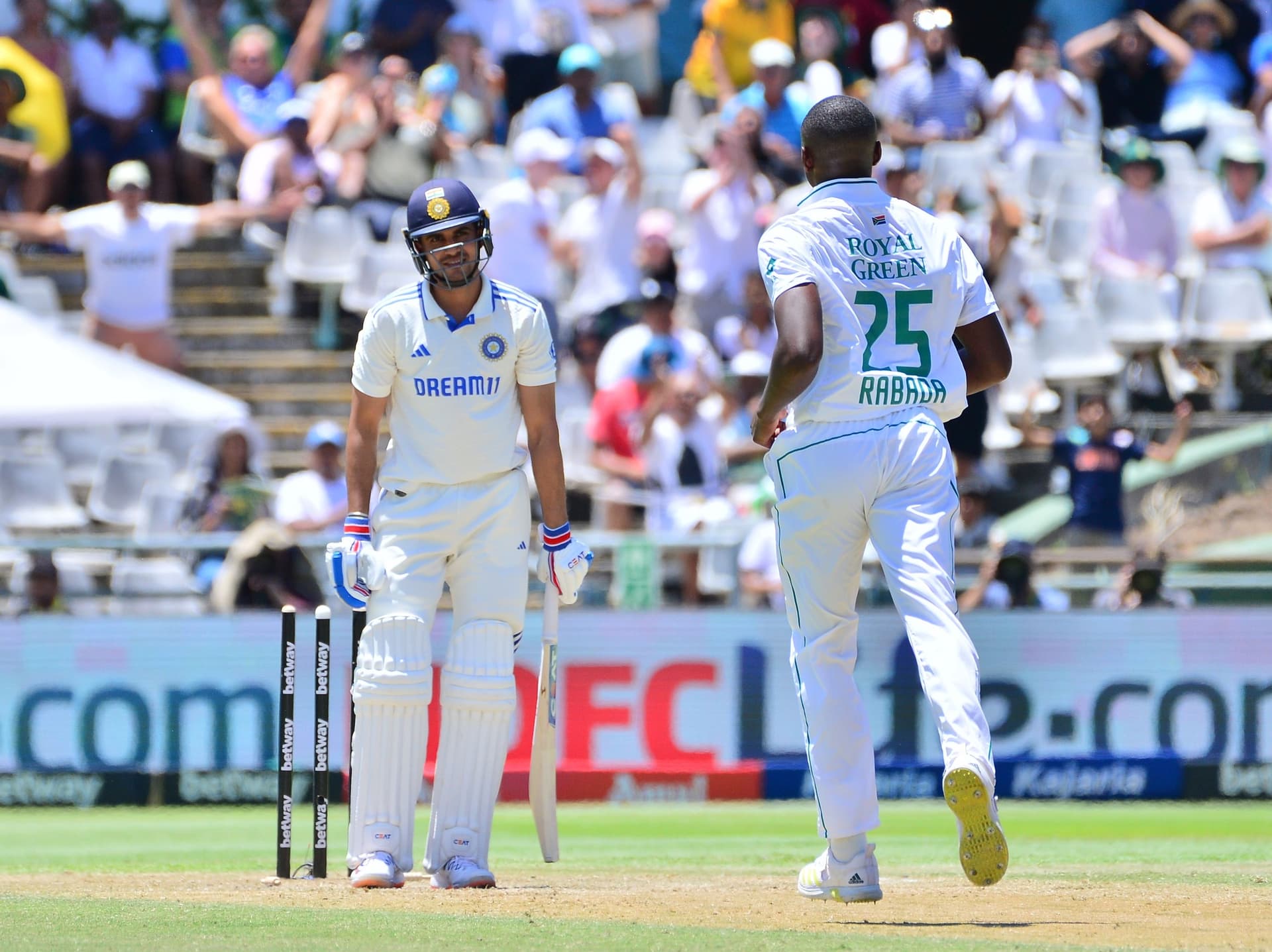Cricket
The Shortest Test Matches in Cricket History!
How cricket teams over the years delivered top-notch performances that saw Test matches ending in a few days

Kagiso Rabada celebrates the wicket of Shubman Gill//Getty Images
Test cricket is known as the purest form of the game and the reason behind that is it tests the skills, determination and ability of both batters and bowlers over the five days. The longest format of the game often produces high-quality matches and to get a result, it requires a team to play quality cricket in all the sessions.
However, there have been various incidents as well where the Test matches have ended in a flash. The prime reason for that has been the brilliance of bowlers. Quite a few times, it has happened when conditions have favoured bowlers and they have made a massive impact because of that. There have been times when pacers and spinners have made batters dance to their tunes. This has resulted in games ending earlier, and in this piece, we take a look at the shortest Test match in the history of the game.
The Shortest Test Match in Game of Cricket
| Balls bowled | Fixture | Winner | Margin | Venue, Year |
| 642 | South Africa vs India | India | 7 wickets | Cape Town, 2024 |
| 656 | Australia vs South Africa | Australia | Innings & 72 runs | Melbourne, 1932 |
| 672 | West Indies vs England | England | 4 wickets | Bridgetown, 1935 |
| 788 | England vs Australia | England | Innings & 21 runs | Manchester, 1888 |
| 792 | England vs Australia | Australia | 61 runs | Lord's, 1888 |
642 balls in South Africa vs India in Cape Town, 2024
The shortest Test match in the history of Test cricket came between South Africa and India in Cape Town in 2024. The game between the two teams lasted just 642 balls (107 overs) in all. The Proteas team won the toss and opted to bat first but the decision turned out to be worse. The Newlands pitch had a lot of space for the fast bowlers and Indian pacers capitalized on that. Mohammed Siraj wreaked havoc across the opposition’s batting lineup as he took 6 wickets. He was supported well by Jasprit Bumrah and Mukesh Kumar as they picked two wickets each, helping India bundle out South Africa for just 55 runs in just 23.2 overs.
The pitch didn’t get any better for India as well as they too struggled to get going with the bat. Yashasvi Jaiswal bagged a duck but skipper Rohit Sharma (39) and Shubman Gill (36) fought their way to vital 30s but the nature of the pitch didn’t allow them to go forward. Virat Kohli was the top run-maker for India with 46 runs while five batters each bagged a duck as they got all out for 153 runs in 34.5 overs, taking a lead of 98 runs. For South Africa, Kagiso Rabada, Lungi Ngidi and Nandre Burger picked three wickets each.
In the second innings, with a deficit of 98 runs, South Africa opener Aiden Markram came with one of his best innings in the longest format of the game. He played a magical innings of 106 while others around him struggled. This time Jasprit Bumrah was the pick of the bowlers as he bagged 6 wickets while Mukesh Kumar picked two wickets. Mohammed Siraj and Prasidh Krishna were also among the wickets. Their effort saw India ending South Africa’s innings on 176 runs 36.5, setting a target of 79 runs.
Yashasvi Jaiswal (28) gave India a brutal start while skipper Rohit Sharma (16) remained not out. Shubman Gill (10) and Virat Kohli (14) contributed as well as India chased the target in 12 overs.
656 balls in Australia vs South Africa in Melbourne, 1932
The second-ever shortest Test match came in 1932 between Australia and South Africa In Melbourne. The game saw only 656 balls being bowled. It was the shortest-ever match and held the record for 92 years. In a game, where South Africa opted to bat first, they got all out just 36 runs inside 23.2 overs. Bert Ironmonger was the pick of the bowlers as he picked a fifer while Laurie Nash bagged four wickets along with Stan McCabe, who took one scalp.
In response, it wasn’t a good outing for Australia as well with the bat. Skipper Bill Woodfull bagged a golden duck and even though Jack Fingleton (40) and Keith Rigg (22) had starts, they couldn’t carry on. Alan Kippax (42) was the top scorer for the team but wickets at the other fell like a pack of cards. Sandy Bell, Neville Quinn and Quintin McMillan bagged three wickets each as South Africa bundled out Australia for 153 runs in 54.3 overs.
With a deficit of 117 runs, South Africa came up with the bizarre batting effort. They got all out for just 45 runs in 31.3 overs. Bert Ironmonger picked 6 wickets with the ball while Bill O’Reilly bagged three scalps as Australia won the game by the massive margin of innings and 72 runs.
25 Tests have been completed within two days in the history of Men's Test cricket
672 balls in West Indies vs England in Bridgetown, 1936
West Indies vs England in Bridgetown, 1936, is the third shortest Test match in the history of the game. The game between the two teams was marred by persistent rain but in the limited time both the teams ensured that they produced a result. The game lasted for just 672 balls and saw England winning the game by 4 wickets. The Three Lions won the toss and opted to field first and they came up with the superlative effort with the ball.
West Indies struggled to get going with the bat as England bowlers were all over them. George Carew (44*) seemed to be the only settled batter for the team while the rest of the batters failed to go past even the 15-run mark. Ken Ferns picked four wickets while George Paine bagged three scalps as they bundled out West Indies for just 102 runs in 47 overs.
West Indies bowlers then made sure they came up with similar effort to that of England with the ball. They picked early wickets with the ball but with a lot of time lost due to rain, and then losing wickets quickly, England decided to declare at 81/7 in 29.3 overs, allowing opponents to have a slender lead. In the second innings, West Indies piled up quick 51 runs and declared their innings in 19 overs, having lost 6 wickets.
Chasing the target of tricky 73 runs, England lost 6 wickets but they managed to win. Patsy Hendren (20) and Wally Hammond (29*) held the fort for the team and helped them win in 16.3 overs. For West Indies, Manny Martindale picked 5 wickets but his effort went in vain.
788 balls in England vs Australia in Manchester, 1888
England and Australia were also involved in one of the shortest Test matches in history. The two arch-rivals were involved in a game that lasted for only 788 balls. The hosts opted to bat first and they couldn’t set a big score on the board. But ultimately it turned out to be a winning total as they came up with the magnificent bowling effort in both the innings.
England opener and skipper WG Grace played a vital hand for the team at the top and slammed 38 runs. He was the top run-maker for the team while the rest of the batters struggled to get going and couldn’t go past the 25-run mark. Charlie Turner was the pick of the bowlers for Australia as he picked 5 wickets while JJ Ferris and Sammy Woods bagged two wickets as the hosts ended with 172 runs in 113.1 overs.
Australia then came up with a horrible batting outing as they were bundled out for just 81 runs. John Lyons was the top scorer for the team as he slammed 22 runs. For England, Bobby Peel picked 7 wickets. The hosts then enforced follow-up and it was an even more poor performance from Australia with the bat. The top four batters bagged ducks. John Lyons (32) and Charlie Turner (26) tried their best but couldn’t take the team past the English total. Australia got all out for 70, losing the game by innings and 21 runs.
792 balls in England vs Australia in Lord’s, 1888
The 1888 Test series between England and Australia saw another shortest Test match. The Test match between the teams at the Lord’s lasted for just 792 balls. It was the first game of the series and the visitors emerged victorious in the game by a margin of 61 runs to take an early lead in the series.
Opting to bat first, Australia got all out for just 116 runs as England bowlers were all over the opposition. Bobby Peel took 4 wickets while Johnny Briggs also bagged three as they ended the visitors’ innings in 71.2 overs. With the bat, England was even poorer than Australia as they were bundled out for just 53 runs in 50 overs. Charlie Turner picked a fifer and put the opposition under pressure.
The second innings saw Australia posting a total of 60 runs in 29.2 and setting England a target of 124 runs. The hosts couldn’t get going at all as they were all out for just 62 runs in 47 overs. Charlie Turner and JJ Ferris picked five wickets each and helped the team win the game.

I am just a guy in his early 20s whose dream was to play cricket but now believes his job is to serve cricket. I picked the cricket bat at the age of 3, pursued science as I grew up but eventually followed my heart to come into journalism and do the second-best thing in the world after playing the sport.